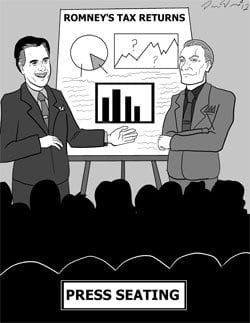
| Rather than release more returns, my tax attorney will take your questions. |
Romney’s taxes raise questions
The most dreaded date on the calendar is tax day. Every citizen who has earned the required income in the previous year must file a tax return with the IRS on that day. A penalty will be assessed if the taxpayer is even one day late.
Everyone understands that tax evasion is a crime, but those are white-collar offenses remote from the realities of the street. Residents of the nation’s cities often confront more threatening crimes involving assault and battery. Most people do not earn enough to benefit from the crazy quilt of loopholes in the tax code that give rise to violations and are available only to those with substantial incomes.
Consequently, concern over the refusal of Mitt Romney to release his tax returns can be confusing to those unacquainted with the realms of high finance, especially since there is no allegation that he has broken the law. In this case, the reason for the concern is quite simple. It is customary for presidential candidates to provide tax returns for multiple years, but it is especially important in this campaign. Romney has chosen to base his qualification for the presidency primarily on his business acumen.
Many Americans respect and emulate those who are successful in business. However, a series of well publicized business practices such as the Bernie Madoff ponzi scheme and the subprime mortgage fiasco that led to the demise of Countrywide Financial and IndyMac Bank as well as the collapse of the U.S. banking system have tempered public esteem for the touted CEO. Some top executives were even awarded substantial bonuses despite the failure of their banks.
Now comes Mitt Romney who declares that he has the plan to cause the American economy to flourish and to create jobs. As yet he has not disclosed the details of that plan. The only way for the public to gain some insight into Romney’s claims and managerial style is to evaluate his performance as CEO and sole stockholder of Bain Capital.
That is the first step of the analysis. The acid test is to learn from Romney’s tax returns how he made his money and what provisions he has relied on to avoid taxes. It is perfectly legal to take advantage of tax loopholes to reduce one’s taxes, but to do so might not be appropriate for one planning to be president. Voters can reasonably believe such a president will not support a progressive tax system that taxes the very rich at a higher rate than those with a modest income.
In 2010 and 2011, the Romneys earned $42.5 million and paid $6.2 million in taxes, a bit less than 15 percent and substantially less than the rate of 25 percent that the average taxpayer reaches at $40,000. The tax returns Romney released for those years raise several questions:
• How did his IRA grow to a value of $100 million;
• Why did he have a Swiss bank account;
• What was the reason for establishing businesses in offshore tax havens in the Cayman Islands and Bermuda?
When Romney’s father ran for president 40 years ago, he released 12 years of tax returns. Romney has released only two years, 2010 and 2011. In 2008, Sen. John McCain released only two years of returns. Relying on the McCain precedent Romney insists that two years is enough, but Romney’s candor is subject to question and his finances are extremely complex. Romney is no McCain.






